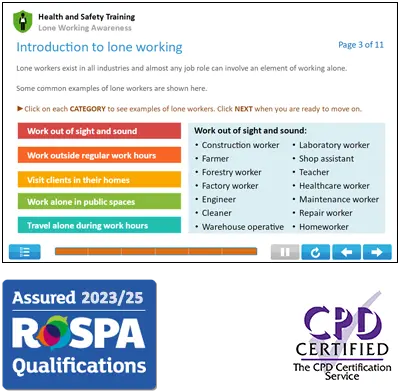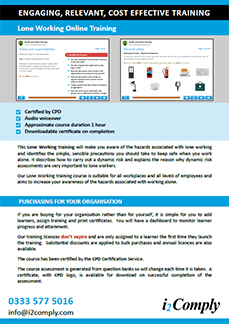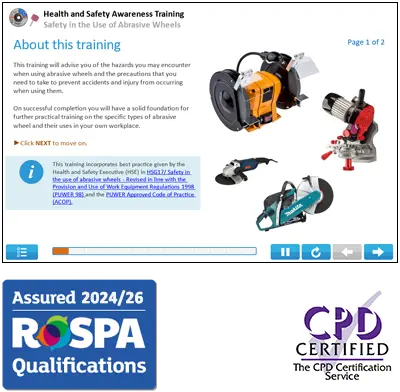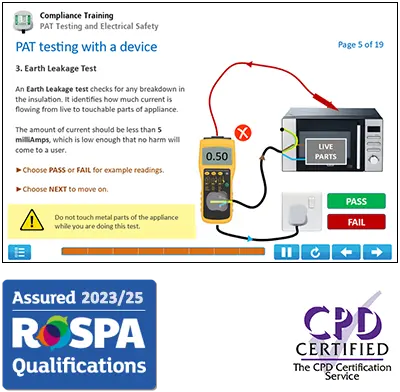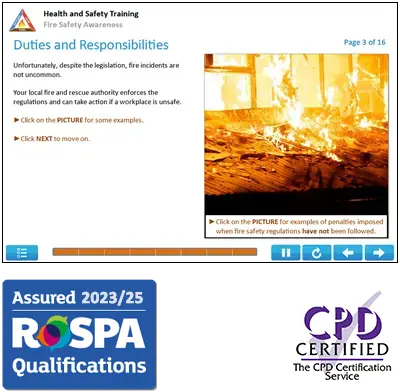Discounts Available For Bulk Purchases
| No. of licences per course |
% saving |
|---|---|
| 1 - 9 | - |
| 10 - 19 | 10% |
| 20 - 49 | 20% |
| 50 - 99 | 25% |
| 100 - 149 | 30% |
| 150 - 999 | 35% |
Lone Worker Online Training
£15.00 + £3.00 VAT
- Assured by RoSPA Qualifications
- Certified by CPD
- Audio voiceover
- Approximate duration of 1 hour
- Downloadable certificate on completion
- 100% online training
- No time limits
This Lone Worker online training course will make you aware of the hazards associated with lone working and identifies the simple, sensible precautions you should take to keep safe when you work alone. It describes how to carry out a dynamic risk assessment and explains why dynamic risk assessments are very important to lone workers.
Lone workers carry out some or all of their work activities by themselves, without any colleagues around. This makes it more difficult for lone workers to get help when they need it. So they must be able to recognise hazards and cope with unpredictable and unforeseen situations on their own. Lone worker training is an essential part of ensuring that lone workers stay alert to the hazards in their work environment and are able to manage the risks.
Our Lone Worker training takes around 1 hour to complete.
Who is Lone Worker training for?
Online Lone Worker training applies to anyone, contracted or self-employed, who work by themselves without close or direct supervision. Typical examples include taxi drivers, delivery drivers, petrol station attendants, security staff, cleaners, shop assistants and engineers.
Reviewed and approved by lead bodies
Our Lone Worker Course has been assured by the Royal Society for the Prevention of Accidents as providing up-to-date, quality and content-approved training.
The training course also complies with the Continuing Professional Development (CPD) guidelines and is accredited by the CPD Certification Service.


Course learning outcomes
At the end of the online course you will be able to:
- Outline what lone working means and the occupations that involve working alone.
- Identify the hazards associated with lone working.
- Outline your and your employer’s responsibilities in regard to lone working.
- Understand how to carry out a dynamic risk assessment to identify potential risks.
- Outline practical safety measures and techniques you can use while lone working.
Example course pages
You will find three screenshots from our Lone Worker online training course below. We design all our online courses to be simple but informative, using a mixture of text, images, tables and professional audio. This approach makes our courses easy to learn from and enjoyable.
(Click on the example screens below to view)
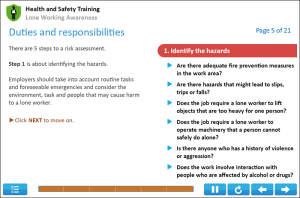
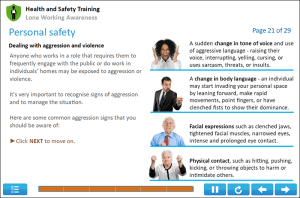
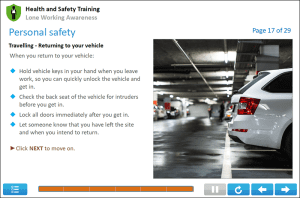
Course content
The Lone Worker online course contains the following 4 topics:
1 – Introduction to lone working
The first topic explains what lone working means and gives examples of occupations that involve working alone. It also identifies the reason why lone workers are at a higher risk of harm and the risks involved in lone working. Finally, you will learn which high-risk activities workers should never carry out alone.
2 – Duties and responsibilities
The second topic explains the legislation that aims to protect lone workers and the employer and employee responsibilities with regard to lone working. It identifies when employers should conduct a risk assessment and how a hierarchy of controls is used to establish appropriate risk controls when carrying out a risk assessment. It also covers what is meant by the right to refuse unsafe work.
3 – Dynamic risk assessment
The third topic explains the purpose of a dynamic risk assessment and when a dynamic risk assessment is necessary. You will also learn the reason why dynamic risk assessments are important to lone workers and the 4 principal steps of a dynamic risk assessment. Finally, it covers how to conduct a dynamic risk assessment.
4 – Personal safety
The final topic you will learn about safety precautions a lone worker should use when they visit clients’ homes, work alone in public, work on the same premises but out of sight and sound of a colleague, work outside normal working hours, work in isolated or rural areas, work from home, travel and encounter aggression or violence.
Course assessment
The course assessment is created from question banks and will consist of 15 questions. Each time the course assessment is taken you will get a new set of questions. Therefore, this Lone Worker training course can be used for initial and refresher training.
Course certificate
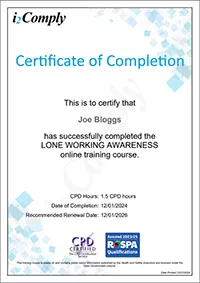
Your course certificate will be downloadable as soon as the training has been passed. When you return to the training system you will be able to download or print your certificate. As the course is RoSPA-assured and CPD-certified the certificate will include both logos.
How long is this Lone Worker training certificate valid for?
Your Lone Worker course certificate does not include an expiry date. However, due to the hazards associated with lone working, we recommend the training is retaken every 2 years. This is to ensure that the knowledge of hazards and safety precautions required by Lone Workers is maintained.
Your training certificate will contain the recommended renewal date.
Course reviews
It is always a good sign to see positive reviews for any product you are looking to buy. Take a look at our Lone Worker Course Reviews and purchase the course today.
We value your feedback and it is not only extremely important to us, but it also helps new customers see what other people think of our training courses. So, if you have a spare couple of minutes, please leave a review on Reviews.io or leave a review on Google.
What is a Lone Worker?
A lone worker is defined as someone who works by themselves, without close or direct supervision.
The phrase lone worker does not always mean that they work alone, away from any other person. Instead, a lone worker is somebody who spends all or part of their working day without a co-worker or teammate present. People may work alone in fixed establishments or away from a fixed base.
Who is responsible for lone worker training?
The responsibility for lone worker training falls on the employer.
The Health and Safety at Work etc. Act 1974 (HASWA) requires an employer to protect the health, safety and welfare of their workforce. As a part of this duty, employers must ensure lone workers receive appropriate information and training, and are competent to fulfil their work duties safely.
More online UK Health & Safety courses
We have wide range of health and safety courses that your business or organisation can use to gain those vital certificates of compliance.
- Abrasive Wheels Training Course
- Asbestos Awareness Course (Category A)
- COSHH Awareness Training
- DSE Awareness Course
- First Aid in the Workplace Course
- Hand-Arm Vibration Awareness Course
- Legionella Awareness Training
- Manual Handling Awareness Course
- Mental Health Awareness Course
- Noise Awareness Training
- Ladder Safety Training
- Spill Kit:Chemicals & Oils training
- Stress in the Workplace Course
- Working at Height Course
- Working in Confined Spaces Course
It’s not just health and safety courses that i2Comply supplies. View all our online courses, where you’ll find training for regulatory compliance, food hygiene, health and social care and fire safety.
Have a question for us?
Members of our friendly support team are on hand to provide you with any course information you require. We will also help you with your account, no matter how big or small the task, please just contact us.
Finally, we also have our help & knowledge base area, which contains answers to a lot of previous and frequently asked questions.
£15.00 + £3.00 VAT
Discounts Available For Bulk Purchases
| No. of licences per course |
% saving |
|---|---|
| 1 - 9 | - |
| 10 - 19 | 10% |
| 20 - 49 | 20% |
| 50 - 99 | 25% |
| 100 - 149 | 30% |
| 150 - 999 | 35% |
Single sign-on (SSO)
Our LMS can be configured to authenticate with your systems, so your users don’t need to remember additional passwords or usernames.
Competence Assurance
Our integrated software environment helps you to plan, develop and monitor enterprise capability and compliance, to minimise the risk of incidents and non-compliance.
Bespoke Online Training
We believe that a desire to acquire new knowledge and skills is the most powerful motivator for most individuals - not gimmicks or tricks.
Call us on 0333 577 5016 for more information or complete the contact form and we'll call you back.
